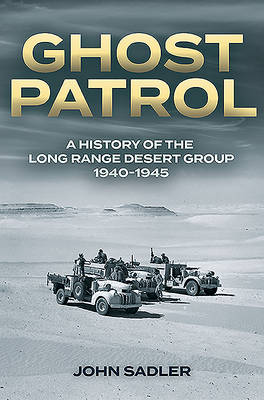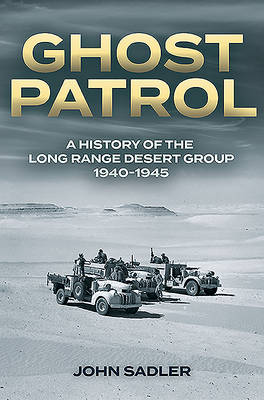
Nos liseuses Vivlio rencontrent actuellement des problèmes de synchronisation. Nous faisons tout notre possible pour résoudre ce problème le plus rapidement possible. Toutes nos excuses pour la gêne occasionnée !
- Retrait gratuit dans votre magasin Club
- 7.000.000 titres dans notre catalogue
- Payer en toute sécurité
- Toujours un magasin près de chez vous
Nos liseuses Vivlio rencontrent actuellement des problèmes de synchronisation. Nous faisons tout notre possible pour résoudre ce problème le plus rapidement possible. Toutes nos excuses pour la gêne occasionnée !
- Retrait gratuit dans votre magasin Club
- 7.000.0000 titres dans notre catalogue
- Payer en toute sécurité
- Toujours un magasin près de chez vous
23,95 €
+ 47 points
Format
Description
An accessible and entertaining new history of the Long Range Desert Group, forerunner of the SAS, famous for their exploits in the Desert War, and full of memorable characters and archetypal British heroes.
The origins of most of the west's Special Forces can be traced back to the Long Range Desert Group which operated across the limitless expanses of the Libyan Desert, an area the size of India, during the whole of the Desert War from 1940 - 1943. After the defeat of the Axis in North Africa they adapted to serve in the Mediterranean, the Greek islands, Albania, Yugoslavia and Greece. They became the stuff of legend. The brainchild of Ralph Bagnold, a prewar desert explorer, featured, in fictional terms in The English Patient, who put all of his expertise into the creation of a new and, by the standards of the day, highly unorthodox unit. Conventional tactical thinking shunned the deep heart of the vast desert as it was thought to be a different planet, a harsh, inhospitable wilderness where British forces could not possibly survive even less operate effectively. Bagnold, Pat Clayton and Bill Kennedy Shaw created a whole new type of warfare.
Using specially adapted vehicles and the techniques they'd learned in the '30s, recruiting only men of the right temperament and high levels of fitness and endurance, the first patrols set out bristling with automatic weapons. The 30-cwt Chevy truck and the famous Jeep have become iconic, the LRDG, in a dark hour, was the force which took the fight to the enemy, roving over the deep desert - a small raider's paradise, attacking enemy convoys and outposts, destroying aircraft and supplies, forcing the Axis to expend more and more resources protecting their vulnerable lines.
Their work was often dangerous, always taxing, exhausting and uncomfortable. They were a new breed of soldier. The Axis never managed to equip any similar unit, they never escaped their fear of the scorching wilderness. Once the desert war was won they transferred their skills to the Mediterranean sector, re-raining as mountain guerrillas, serving in the ill-fated Dodecanese campaign, then in strife torn Albania, Yugoslavia and Greece, fighting alongside the mercurial partisans at a time the Balkans were sliding towards communist domination or civil war.
In addition LRDG worked alongside the fledgling SAS and they established, beyond all doubt, the value of highly trained Special Forces, a legacy which resonates today.
The origins of most of the west's Special Forces can be traced back to the Long Range Desert Group which operated across the limitless expanses of the Libyan Desert, an area the size of India, during the whole of the Desert War from 1940 - 1943. After the defeat of the Axis in North Africa they adapted to serve in the Mediterranean, the Greek islands, Albania, Yugoslavia and Greece. They became the stuff of legend. The brainchild of Ralph Bagnold, a prewar desert explorer, featured, in fictional terms in The English Patient, who put all of his expertise into the creation of a new and, by the standards of the day, highly unorthodox unit. Conventional tactical thinking shunned the deep heart of the vast desert as it was thought to be a different planet, a harsh, inhospitable wilderness where British forces could not possibly survive even less operate effectively. Bagnold, Pat Clayton and Bill Kennedy Shaw created a whole new type of warfare.
Using specially adapted vehicles and the techniques they'd learned in the '30s, recruiting only men of the right temperament and high levels of fitness and endurance, the first patrols set out bristling with automatic weapons. The 30-cwt Chevy truck and the famous Jeep have become iconic, the LRDG, in a dark hour, was the force which took the fight to the enemy, roving over the deep desert - a small raider's paradise, attacking enemy convoys and outposts, destroying aircraft and supplies, forcing the Axis to expend more and more resources protecting their vulnerable lines.
Their work was often dangerous, always taxing, exhausting and uncomfortable. They were a new breed of soldier. The Axis never managed to equip any similar unit, they never escaped their fear of the scorching wilderness. Once the desert war was won they transferred their skills to the Mediterranean sector, re-raining as mountain guerrillas, serving in the ill-fated Dodecanese campaign, then in strife torn Albania, Yugoslavia and Greece, fighting alongside the mercurial partisans at a time the Balkans were sliding towards communist domination or civil war.
In addition LRDG worked alongside the fledgling SAS and they established, beyond all doubt, the value of highly trained Special Forces, a legacy which resonates today.
Spécifications
Parties prenantes
- Auteur(s) :
- Editeur:
Contenu
- Nombre de pages :
- 232
- Langue:
- Anglais
Caractéristiques
- EAN:
- 9781612008424
- Date de parution :
- 20-02-20
- Format:
- Livre broché
- Format numérique:
- Trade paperback (VS)
- Dimensions :
- 152 mm x 229 mm
- Poids :
- 453 g







